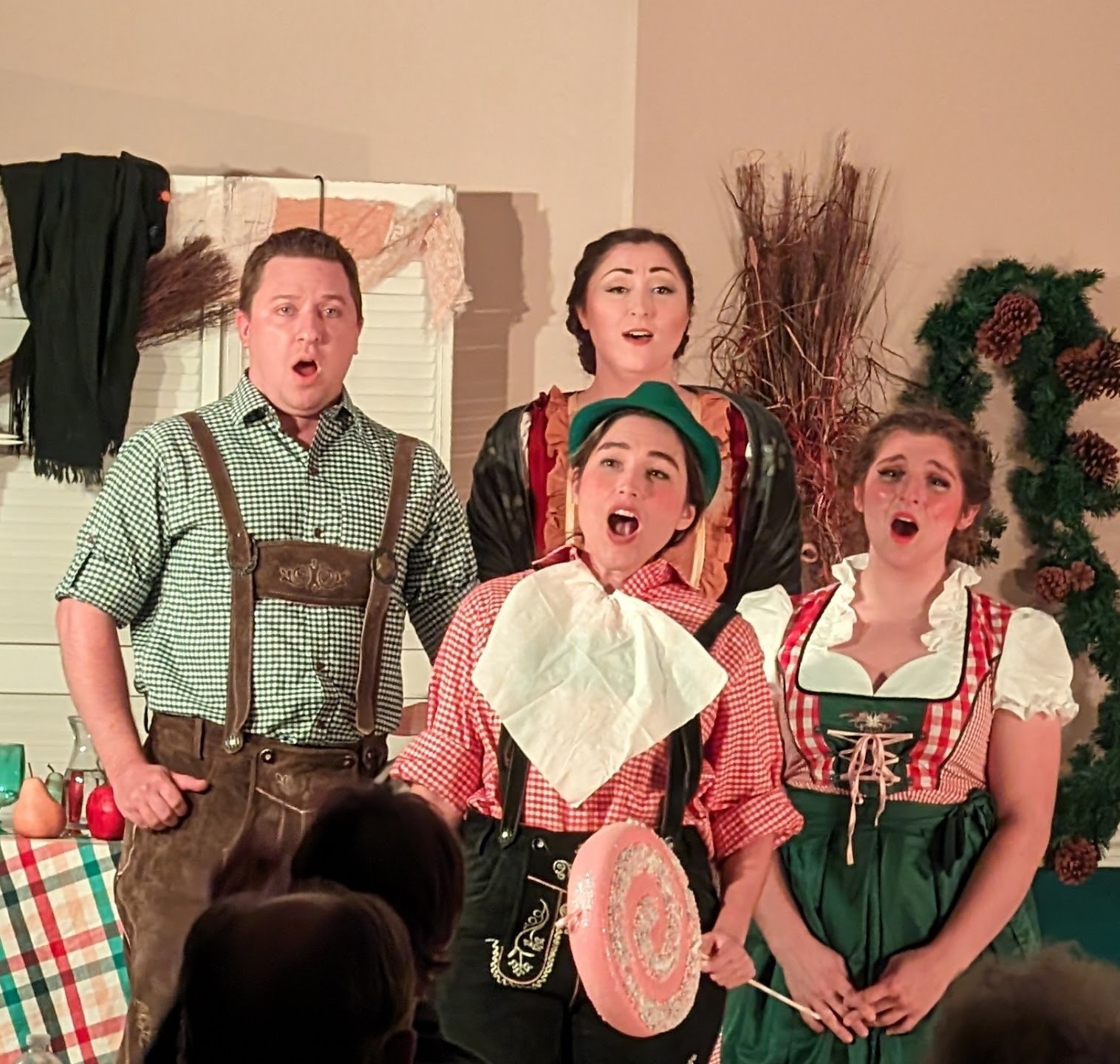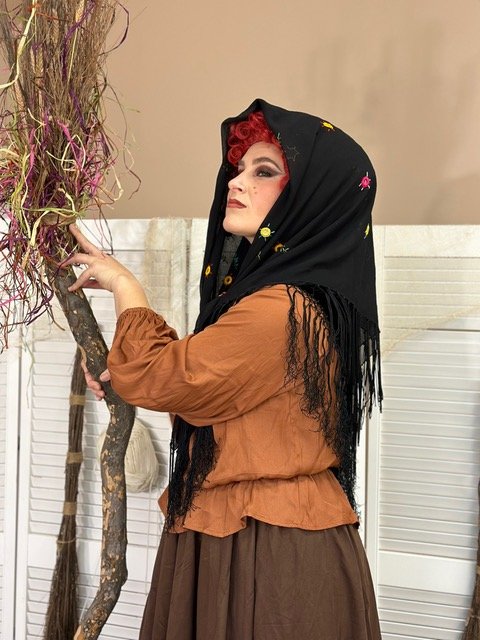I attended Shakespeare Opera Theatre’s performance of the opera, Hansel and Gretel, on Saturday afternoon, and it proved to be quite a pleasure as well as a rewarding arts experience. I told my wife that next time we should bring some friends (be sure to read The Fan Experience section below).
Engelbert Humperdinck (the composer, not the 1960s pop music singer who adopted his name to help the singer revitalize his career) was a talented, even gifted German composer. He wrote six operas and many other well received musical compositions, but it is his opera Hansel and Gretel for which he is widely known today. The libretto by his sister Adelheid Wette is based on the famous Brothers Grimm fairy tale. The collaboration that led to the opera occurred when his sister asked him to compose music for four folk songs to be part of a children’s marionette show she was planning. The very pleasing melodies and themes of the folks songs are employed in the opera.
In the rear, JP Gorski as Peter, the father, Alicia Woodberry as Gertrud, the mother, with Julie Silva as Hansel and Catherine Moss as Gretel. Photo by Joshua Waits; courtesy of Shakespeare Opera Theatre.
The opera was first performed on December 23, 1893, in Germany, conducted by the even more famous composer Ricard Strauss. Humperdinck’s opera enjoyed immediate success and became associated with Christmas in Germany and gradually also in the rest of the world. The Metropolitan Opera’s first live, on-air broadcast was of Hansel and Gretel, performed in New York City on December 25, 1931. It is frequently performed worldwide today, especially during the holiday season. It’s themes of childhood innocence and vulnerability, coupled with an overriding divine protection of the innocent fit well with the celebration of Christmas. To make the opera more accessible, SOT used an English language adaptation of the opera, slightly trimmed and modified; musical accompaniment was by piano.
Shakespeare Opera Theatre is a local opera company founded in 2015 by soprano, Dr. Lori Lind and based in McLean, VA. After spending years touring around the world, Dr. Lind decided to settle down in northern Virginia and to stay connected to the performance arts by merging her two loves, acting in Shakespeare productions, and singing opera. She found an acceptance and performance venue at the Grace Episcopal Church in The Plains, Virginia, which was expanded a few years ago to include performances at St. Thomas Episcopal Church, McLean; maximum seating at both is around 85. While operas based on Shakespeare’s plays are a repeating element of the company’s seasons, the name is meant to indicate a focus on classic works, especially operas where acting is emphasized. After a couple of rocky years in the beginning, SOT found its footing, and Dr. Lind reports now that performances are frequently selling out. Based on the matinee performance I saw on Saturday afternoon, it is easy to understand why.
Amanda Wyand as The Witch. Photo by Portraits by Bronder; courtesy of Shakespeare Opera Theatre.
You might wonder about the quality of singers that a small, local opera company can attract and afford to employ; I did. However, during the performance, those thoughts changed to how can SOT attract singers of such quality! SOT’s target pool is “emerging artists” (we once called these singer’s young, but now they arrive holding college degrees in music and graduate degrees in voice and have already been performing professionally for years, though still youngish). The vocalists come from across the U.S. and even beyond. Dr. Lind told me that SOT auditioned 48 singers for the seven soloist positions, requiring each singer to perform five arias. As performers themselves, Dr. Lind and the production team have a great deal of experience to draw on; of local interest, I noted that Dr. Lind won the 2005 vocal competition held annually by Annapolis Opera and is the current Organist and Choirmaster at St. Thomas.
Hansel and Gretel are the lead roles for the opera, featured in every scene. Soprano Catherine Moss as Gretel and mezzo-soprano Julie Silva as Hansel were an excellent pairing, believably portraying a teenaged or preteen sister and brother who love to quarrel almost as much as they love each other’s company. Ms. Silva sang with a lovely medium deep tone, perfect for a pants role, and Ms. Moss’ voice has a very pretty timbre. Their voices blended beautifully in their duets. Ms. Moss is a current member of the University of Maryland Opera Studio; Ms. Silva has sung mezzo-soprano roles worldwide, including performing previously as Hansel. The Witch was portrayed by mezzo-soprano Amanda Wyand, who in addition to singing well seemed to enjoy giving a fine, campy performance as the Witch. Ms. Wyand was an apprentice artist with Opera Roanoke and in 2022 was an Ader Emerging Artist with Charlottesville Opera.
Gertrud, the mother, and Peter, the father were sung by soprano Alicia Woodberry and baritone JP Gorski, both of whom sang well and gave engaging performances. Peter constantly singing la, la, la, la melodically became an earworm for me. The roles of the Sandman and Dew Fairy were sung by two charmers, mezzo-soprano Elizabeth Barnes and soprano Kathryn Brode, respectively; both left me longing for more.
Elizabeth Barnes as Sandman and Kathryn Brode as the Dew Fairy. Photos by Portraits by Bronder; courtesy of Shakespeare Opera Theatre.
Hansel and Gretel’s popularity is not only due to its appeal as a fairy tale opera for children; it also offers a melodic, musically sophisticated score. Composer Humperdinck became friends with Richard Wagner and assisted him in a production of Parsifal at Bayreuth. Musicologists state that the music offers a Wagnerian range of colors and textures, with endless polyphonic variations on the folk melodies; they have even questioned whether the music is too rich just for a simple fairy tale opera. The piano accompaniment for this performance was supplied by SOT’s Associate Director and Conductor Dr. Lisa Bloy. The melodies and themes translated well for a production of Hansel and Gretel in a smaller venue. Ms. Bloy’s playing might have been more nuanced but her timing with the singers was impeccable. Time and again I marveled at how well they performed together.
The small performance hall for Hansel and Gretel had simple attractive, thematic sets: a cottage set, a forest set, and a candy house set for the different scenes; amusingly, Ms. Lind told the audience that we must ignore the sets not in use for the current scene; it was not a problem. The Bavarian styled costumes were a delight, though Gertrud’s lavish red gown, while lovely, was more fitting for a queen than an impoverished broom maker’s wife. This version of the opera was modified for the final scene where, in other versions, the children previously consumed by The Witch appear and are brought back to life. My difficulty deciphering sung text, even when sung in English, left me unclear whether that aspect had been addressed; my wife, who had not seen the opera before, thought the ending worked as presented. Regardless, it was a happy ending for all, even The Witch, and the audience was treated to a closing chorus by the ensemble.
Hansel and Gretel is based on a fairy tale that can be presented in many ways. The SOT presentation is mild in terms of scariness, played more for comedic effect. Still, children become lost (happiness endangered); children are threatened (innocence lost), and children save themselves (with a little divine intervention) and eventually are reunited with their grateful parents (oh, joy). All that coupled with great singing and music works for me, at Christmas or anytime.
The Fan Experience: Shakespeare Opera Theatre scheduled Hansel and Gretel performances for December 9 (matinee and evening) and 10 (matinee) at St. Thomas Episcopal Church, Mclean, and on December 16 (matinee and evening) at Grace Episcopal Church in The Plains, Virginia. The opera is sung in English without subtitles. SOT’s next production will be Verdi’s Macbeth in July.
SOT’s performance had more of a party atmosphere rather than the church service atmosphere of our major opera halls. I found little pretense with SOT; they readily own their limitations and still managed to engage us fully. Dress is “as you like it” and seating is at tables. Thematic snacks and non-alcoholic drinks are offered for sale (I had the endless hot chocolate) which can be consumed before, during, or after performances. Children were not only encouraged to attend but Ms. Lind, in her opening remarks, stated not to worry if your children began to act like children, let them be children, and if any adults wanted to play with the toys and coloring books at the back, feel free. Autumn Grimes is SOT’s children’s helper and keeps the children engaged.
I will close with a personal anecdote and just a wee bit of pontificating. The college I attended required attendance at church your first year. I fell in love with the choir which featured an outstanding soprano soloist. The second year I kept attending regularly, in all honesty, primarily to hear the choir. This was not the Mormon Tabernacle Choir, but this local choir provided some of my most cherished musical experiences, further enhanced by being part of a community. I worry that opera has lost much of its direct connection with people and the community contact has become too impersonal, especially as younger generations move increasingly online. Shakespeare Opera Theatre offers an old-time approach in a modern setting using professional quality singers. You might find it rewarding, and if you’d also like to rekindle that old flame of community connection, maybe bring a friend.




